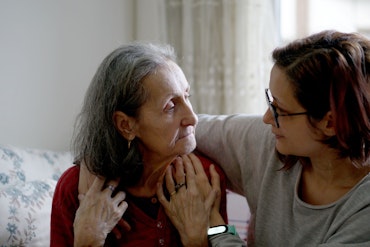Supporting staff caring for those ‘dying to talk’
Researchers from the University of Sydney have embarked on a landmark project to ensure Australians with intellectual disability understand the concept of death and their own mortality, and are appropriately supported to comprehend and cope with end-of-life issues.

Researchers from the University of Sydney have embarked on a landmark project to ensure Australians with intellectual disability understand the concept of death and their own mortality.
In what has been described as a 'world-first', the Dying to Talk project is developing a research-based toolkit to support staff and caregivers to deliver individual information to adults with intellectual disability, and discuss end-of-life planning in everyday contexts.
Professor Roger Stancliffe, from the university’s Centre for Disability Research and Policy, says access to information about death is a fundamental human right, but those with an intellectual disability have frequently been marginalised and disempowered to make decisions about end-of-life care.
“About 3% of the Australian population has intellectual disability and if we fail to openly discuss dying, we are setting them on a path towards a ‘disenfranchised’ death,” he says.
“It’s a common misconception that people with intellectual disability don’t know about death, but benevolent exclusion does not help a person with an intellectual disability manage their grief or cope with loss.”
“All too often death isn’t discussed until people with an intellectual disability face the end of their own life or the death of a close loved one, and this can be very traumatic, leading to prolonged grief or adding to mental health issues.”
Watch a presentation on the Dying to Talk project at the University of Sydney.
Dr Michele Wiese, from the Faculty of Health Sciences, says the Dying to Talk project is important because life expectancy for people with intellectual disability is increasing, with many confronting the death of ageing parents and planning their end of life without the support of close family.
“Australians with intellectual disability are living longer so it’s imperative we train staff in community living settings to help adults with intellectual disability learn about end of life and important decisions like organ donation, advance care planning and funeral choices,” Dr Wiese says.
The researchers find that currently many support staff avoid discussions about death for fear of upsetting their clients, or do not feel they have adequate information to answer questions.
“With the right resources and training, support staff can help people with intellectual disability understand death and make their own decisions. Just as many already do about other important life choices like employment and relationships,” she says.
The project is funded by the Australian Research Council and is a joint partnership between the University of Sydney’s Centre for Disability Research and Policy and Sydney-based disability service provider Sunshine.























